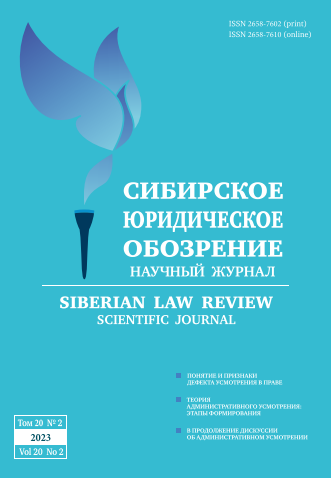The Concept and Characteristics of a Defect of Discretion in Law
- Авторлар: Onosov Y.V.1
-
Мекемелер:
- Ural State Law University
- Шығарылым: Том 20, № 2 (2023)
- Беттер: 110-119
- Бөлім: THEORETICAL AND HISTORICAL LEGAL SCIENCES
- ##submission.datePublished##: 07.07.2023
- URL: https://journal-vniispk.ru/2658-7602/article/view/349070
- DOI: https://doi.org/10.19073/2658-7602-2023-20-2-110-119
- EDN: https://elibrary.ru/RMOPHC
- ID: 349070
Дәйексөз келтіру
Толық мәтін
Аннотация
The article touches upon the problems associated with defects in law related to discretion. An attempt is made to analyze the approaches of legal scholars to the concepts of “defect of law”, as well as related concepts of “defect of a normative legal act”, “defect of legislation”, “error in law”. Attention is focused on the relationship between the concept of “defect in law” and “quality of law”. In relation to individual branch legal sciences, studies of individual defects have been conducted, however, a unified approach to understanding the essence of the relevant legal phenomenon has not been formed. When analyzing the approaches of various researchers to the essence of the defect in law, it should be noted that the authors point to a violation of the requirements related to the quality of the regulatory legal act. A scientific analysis is carried out of the fact that a law enforcement decision based on various legal defects is associated with discretion. The origins of the concept of “defect in law” are considered, since for the first time it began to be used in industry legal sciences. The point of view on the allocation of an expansive and restrictive understanding of the “defect in law” in scientific circulation is interesting. In the first case, we are talking about the state of legal norms, when the regulation of public relations leads to a violation of the optimal balance of the interests of the state, society and the individual. In the second case, we mean legal regulation, the quality level of which is low, and in this regard, infringement of interests occurs. The article presents the Author's definition of “the defect of discretion in law”, as well as the signs of this concept. The criteria of imperfection, according to the Author, should include gaps in law, conflicts of legal norms, uncertainty of legal regulation, violations of the requirements of legal technology in the construction of texts of normative acts, irrational placement of norms in the legal system, excessive duplication of rules of conduct in acts of different legal force, excessive legal regulation. The signs of the sought concept also include: finding a defect of discretion in the law in a specific substantive element of a legal act, as well as the social harmfulness of the defect affecting discretion in the application of law.
Авторлар туралы
Yurii Onosov
Ural State Law University
Хат алмасуға жауапты Автор.
Email: onosov_nn@mail.ru
ORCID iD: 0000-0003-0245-9600
SPIN-код: 2522-2464
Associate Professor of the Department of Theory of State and Law, Candidate of Legal Sci- ences, Associate Professor
Ресей, 21 Komsomolskaya st., Yekaterinburg, 620066Әдебиет тізімі
- Voronin V. V. Formalization of the Concepts of Defect and Its Diagnostic Indicators. Scientists notes PNU. 2013;4(4):825-833. (In Russ.).
- Avak’yan S. A. Samples and Defects in Constitutional Law and Ways of Their Absorption. Constitutional and Municipal Law. 2007;8:3-12. (In Russ.).
- Khludeneva N. I. Defects in the Regulation of Environmental Protection. Moscow: Infra-M Publ.; 2014. 170 p. (In Russ.).
- Vlasenko N. A. Logical Structural Defects in the System of Soviet Law. Pravovedenie. 1991;3:21-28. (In Russ.).
- Kudryavtsev V. N., Nikitinskii V. I., Samoshchenko I. S., Glazyrin V. V. The Effectiveness of Legal Norms. Moscow: Yuridicheskaya literatura Publ.; 1980. 280 p. (In Russ.).
- Tikhomirov Yu. A. Theory of Law. Moscow: Nauka Publ.; 1982. 257 p. (In Russ.).
- Kudryavtsev V. N., Nersesyants V. S., Kudryavtsev Yu. V. Social Deviations. Introduction to Common Theory. Moscow: Yuridicheskaya literatura Publ.; 1984. 320 p. (In Russ.).
- Baranov V. M., Pshenichnov M. A. Law-Making Mistakes as a Factor of Disharmony of Legal Development (Based On the Materials of the International Scientific and Practical Round Table “Law-Making Mistakes: Concept, Types, Practice and Elimination Technique in the Post-Soviet State” (Nizhny Novgorod, May 29-30, 2008)). Juridical Techniques. 2008;2:170-182. (In Russ.).
- Vlasenko N. A. Uncertainty in Law: Nature and Forms of Expression. Journal of Russian Law. 2013;2:32-44. (In Russ.).
- Mushinskii M. A. Problems of Diagnosing Law-Making Defects. Irkutsk: Institute of Legislation and Legal Information named after M. M. Speransky Publ.; 2009. 114 p. (In Russ.).
- Sibgatullina G. R. The Notions of Defect of Law and Legal Error in Contemporary Juridical Science. The Review of Economy, the Law and Sociology. 2012;1:221-224. (In Russ.).
- Tikhomirov Yu. A. Legal Conflict. Moscow: Manuskript Publ.; 1994. 140 p. (In Russ.).
- Pogodin A. V. Defects of Objective Law. Russian Law on the Internet. 2010;4. Available at: http://www.rpi.msal.ru/prints/201004_14pogodin.html (accessed: 15.05.2023). (In Russ.).
- Mateikovich M. S. Defects of Constitutional Law Regulation in the Russian Federation. State and Law. 2007;12:15-21. (In Russ.).
- Suslova N. V. Defects in the Russian Law: Formulation Problems, Scientific Approach, Concept. Gaps in Russian Legislation. 2012;2:36-39. (In Russ.).
- Matuzov N. I. Actual Problems of the Theory of Law. Saratov: Saratov State Academy of Law Publ.; 2003. 512 z. (In Russ.).
- Rozhkova M. A. Legal Facts of Civil and Procedural Law: Agreements on the Protection of Procedural Rights and Procedural Agreements. Moscow: Statut Publ.; 2009. 332 p. (In Russ.).
- Tsibulyak S. I. Definition and Types of Defects of Legal Regulation. Law and Politics. 2012;7:1237-1246. (In Russ.).
- Polyakov S. B. The Faults of Legislation and Law-Enforcement Practice as the Subject of Legal Science. Russian Juridical Journal. 2017;1:16-22. (In Russ.).
Қосымша файлдар












